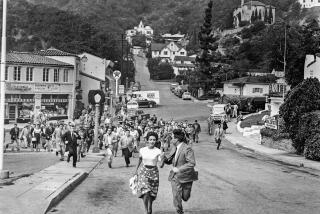Walter Mirisch, his memoir and memories
Oscar-winning producer Walter Mirisch has lived the American dream. He grew up in a poor immigrant family, and despite suffering hardships during the Great Depression, he found his way to Harvard. He later went on to a storied career producing some of the finest films of the 20th century, including “West Side Story,” “The Magnificent Seven” and “In the Heat of the Night.”
On Thursday, the American Cinematheque’s Egyptian Theatre will honor Mirisch with screenings of “The Apartment” and “In the Heat of the Night.” Mirisch will introduce the program and sign copies of his new memoir, “I Thought We Were Making Movies, Not History.”
“The American dream is to be president,” says the 86-year-old Mirisch, laughing one recent morning in his office at Universal Studios. “I didn’t become president. However, I did take advantage of opportunity and luck and whatever talent God gave me. To combine them all and have the career that I wanted to have . . . I certainly did fulfill that dream.”
Mirisch produced his first film, 1947’s “Fall Guy,” for low-budget studio Monogram Pictures Corp. when he was just 25. In 1957, he and his brothers Harold and Marvin formed the Mirisch Co. at United Artists. For two decades, their company produced some of Hollywood’s most memorable movies, including best picture winners “West Side Story” (1961) and “In the Heat of the Night” (1967). Other hits from Mirisch include 1959’s “Some Like It Hot,” 1964’s “The Pink Panther” and “A Shot in the Dark,” 1960’s “The Magnificent Seven” and 1963’s “The Great Escape.”
Mirisch has been getting good notices for his memoir. Kevin Thomas said in The Times the book is “unpretentious, straightforward and is suffused with a sustaining love of family and of filmmaking.”
The book is filled with candid and often funny reminiscences of work with such directors as Billy Wilder, John Sturges, George Roy Hill, Blake Edwards, Robert Wise, Jerome Robbins and Norman Jewison, and actors including Steve McQueen, Jack Lemmon, Peter Sellers and Yul Brynner. Mirisch also discusses involvement in the development of the Academy of Motion Picture Arts and Sciences.
“We were trying to make the best films you possibly could,” says Mirisch. “I don’t think anybody starts out to paint a masterpiece or write the great American play. You try and do the best piece of work you know how. It is only in retrospect that you say: ‘My God. How did all of that work out?’ ”
American Cinematheque’s Egyptian TheatreThe book’s title came from a chat Mirisch had with Sturges, who directed “The Magnificent Seven” and “The Great Escape.”
“He had retired and he called me one day,” recalls Mirisch. “He was off on his boat somewhere and said he had a request to do a magazine piece about ‘The Great Escape.’ He didn’t remember some of the details of a story . . . and [asked whether] by some chance did I still have a copy of the script.
“I said, ‘What the hell are you talking about, John? “The Magnificent Seven” and “The Great Escape” are the best movies you ever made in your whole life. You mean you never kept copies of the script?’ He said to me, ‘What are you talking about? I thought they were just movies, not history.’ The truth of all that . . . provided me with a perspective on my whole career.”
Though Mirisch had some incredible hits during his career, there were also several disappointments, including the 1970 comedy-drama “The Landlord,” Hal Ashby’s first film as a director.
“I thought it was going to be a huge success, and it wasn’t. . . . Sometimes [films] are ahead of their time. Sometimes they don’t find an audience. That’s what makes this business so enigmatic.”
More to Read
From the Oscars to the Emmys.
Get the Envelope newsletter for exclusive awards season coverage, behind-the-scenes stories from the Envelope podcast and columnist Glenn Whipp’s must-read analysis.
You may occasionally receive promotional content from the Los Angeles Times.











